TED演讲:越有钱越无情(中英对照版)
- 格式:doc
- 大小:64.00 KB
- 文档页数:13
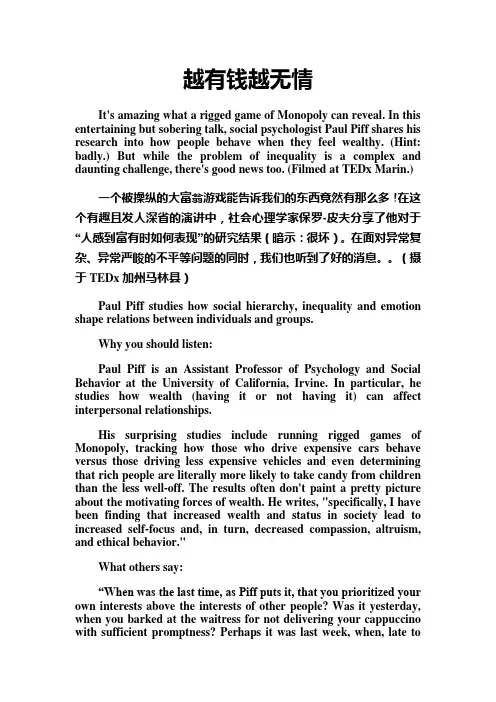
越有钱越无情It's amazing what a rigged game of Monopoly can reveal. In this entertaining but sobering talk, social psychologist Paul Piff shares his research into how people behave when they feel wealthy. (Hint: badly.) But while the problem of inequality is a complex and daunting challenge, there's good news too. (Filmed at TEDx Marin.)一个被操纵的大富翁游戏能告诉我们的东西竟然有那么多!在这个有趣且发人深省的演讲中,社会心理学家保罗-皮夫分享了他对于“人感到富有时如何表现”的研究结果(暗示:很坏)。
在面对异常复杂、异常严峻的不平等问题的同时,我们也听到了好的消息。
(摄于TEDx加州马林县)Paul Piff studies how social hierarchy, inequality and emotion shape relations between individuals and groups.Why you should listen:Paul Piff is an Assistant Professor of Psychology and Social Behavior at the University of California, Irvine. In particular, he studies how wealth (having it or not having it) can affect interpersonal relationships.His surprising studies include running rigged games of Monopoly, tracking how those who drive expensive cars behave versus those driving less expensive vehicles and even determining that rich people are literally more likely to take candy from children than the less well-off. The results often don't paint a pretty picture about the motivating forces of wealth. He writes, "specifically, I have been finding that increased wealth and status in society lead to increased self-focus and, in turn, decreased compassion, altruism, and ethical behavior."What others say:“When was the last time, as Piff puts it, that you prioritized your own interests above the interests of other people? Was it yesterday, when you barked at the waitress for not delivering your cappuccino with sufficient promptness? Perhaps it was last week, when, late towork, you zoomed past a mom struggling with a stroller on the subway stairs and justified your heedlessness with a ruthless but inarguable arithmetic: Today, the 9 a.m. meeting has got to come first; that lady’s stroller can’t be my problem. Piff is one of a new generation of scientists—psychologists, economists, marketing professors, and neurobiologists—who are exploiting this moment of unprecedented income inequality to explore behaviors like those. ” —Lisa Miller, New York Magazine演讲稿正文I want you to, for a moment, think about playing a game of Monopoly, except in this game, that combination of skill, talent and luck that help earn you success in games, as in life, has been rendered irrelevant, because this game's been rigged, and you've got the upper hand. You've got more money, more opportunities to move around the board, and more access to resources. And as you think about that experience, I want you to ask yourself, how might that experience of being a privileged player in a rigged game change the way that you think about yourself and regard that other player?我想让大家花一点时间,想想一下自己正在玩大富翁游戏。
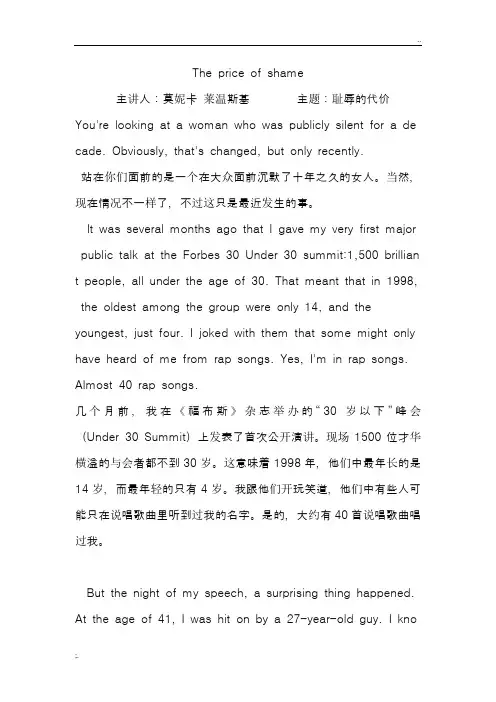
The price of shame主讲人:莫妮卡莱温斯基主题:耻辱的代价You're looking at a woman who was publicly silent for a de cade. Obviously, that's changed, but only recently.站在你们面前的是一个在大众面前沉默了十年之久的女人。
当然,现在情况不一样了,不过这只是最近发生的事。
It was several months ago that I gave my very first major public talk at the Forbes 30 Under 30 summit:1,500 brillian t people, all under the age of 30. That meant that in 1998, the oldest among the group were only 14, and the youngest, just four. I joked with them that some might only have heard of me from rap songs. Yes, I'm in rap songs. Almost 40 rap songs.几个月前,我在《福布斯》杂志举办的“30岁以下”峰会(Under 30 Summit)上发表了首次公开演讲。
现场1500位才华横溢的与会者都不到30岁。
这意味着1998年,他们中最年长的是14岁,而最年轻的只有4岁。
我跟他们开玩笑道,他们中有些人可能只在说唱歌曲里听到过我的名字。
是的,大约有40首说唱歌曲唱过我。
But the night of my speech, a surprising thing happened. At the age of 41, I was hit on by a 27-year-old guy. I know, right? He was charming and I was flattered, and I declin ed. You know what his unsuccessful pickup line was? He c ould make me feel 22 again. I realized later that night, I'm probably the only person over 40 who does not want to be 22 again. 但是,在我演讲当晚,发生了一件令人吃惊的事——我作为一个41岁的女人,被一个27岁的男孩示爱。
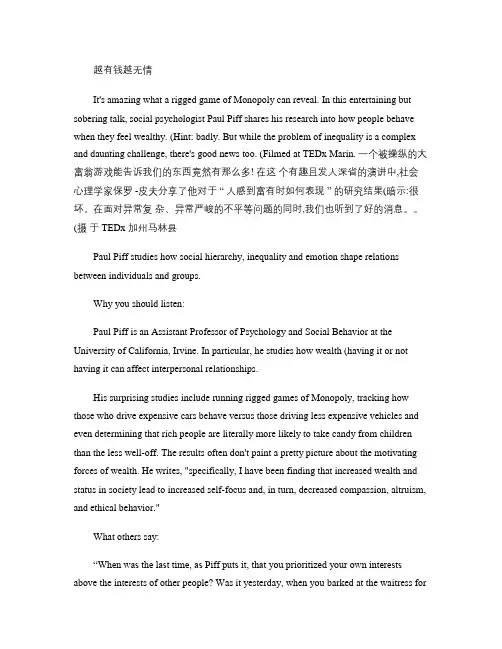
越有钱越无情It's amazing what a rigged game of Monopoly can reveal. In this entertaining but sobering talk, social psychologist Paul Piff shares his research into how people behave when they feel wealthy. (Hint: badly. But while the problem of inequality is a complex and daunting challenge, there's good news too. (Filmed at TEDx Marin. 一个被操纵的大富翁游戏能告诉我们的东西竟然有那么多! 在这个有趣且发人深省的演讲中,社会心理学家保罗 -皮夫分享了他对于“ 人感到富有时如何表现” 的研究结果(暗示:很坏。
在面对异常复杂、异常严峻的不平等问题的同时,我们也听到了好的消息。
(摄于 TEDx 加州马林县Paul Piff studies how social hierarchy, inequality and emotion shape relations between individuals and groups.Why you should listen:Paul Piff is an Assistant Professor of Psychology and Social Behavior at the University of California, Irvine. In particular, he studies how wealth (having it or not having it can affect interpersonal relationships.His surprising studies include running rigged games of Monopoly, tracking how those who drive expensive cars behave versus those driving less expensive vehicles and even determining that rich people are literally more likely to take candy from children than the less well-off. The results often don't paint a pretty picture about the motivating forces of wealth. He writes, "specifically, I have been finding that increased wealth and status in society lead to increased self-focus and, in turn, decreased compassion, altruism, and ethical behavior."What others say:“When was the last time, as Piff puts it, that you prioritized your own interests above the interests of other people? Was it yesterday, when you barked at the waitress fornot delivering your cappuccino with sufficient promptness? Perhaps it was last week, when, late towork, you zoomed past a mom struggling with a stroller on the subway stairs and justified your heedlessness with a ruthless but inarguable arithmetic: Today, the 9 a.m. meeting has got to come first; that lady’s stroller can’t be my problem. Piff is one of a new generation of scientists — psychologists, economists, marketing professors, and neurobiologists — who are exploiting this moment of unprecedented income inequality to explore behaviors like those. ” — Lisa Miller, New York Magazine演讲稿正文I want you to, for a moment, think about playing a game of Monopoly, except in this game, that combination of skill, talent and luck that help earn you success in games, as in life, has been rendered irrelevant, because this game's been rigged, and you've got the upper hand. You've got more money, more opportunities to move around the board, and more access to resources. And as you think about that experience, I want you to ask yourself, how might that experience of being a privileged player in a rigged game change the way that you think about yourself and regard that other player?我想让大家花一点时间, 想想一下自己正在玩大富翁游戏。
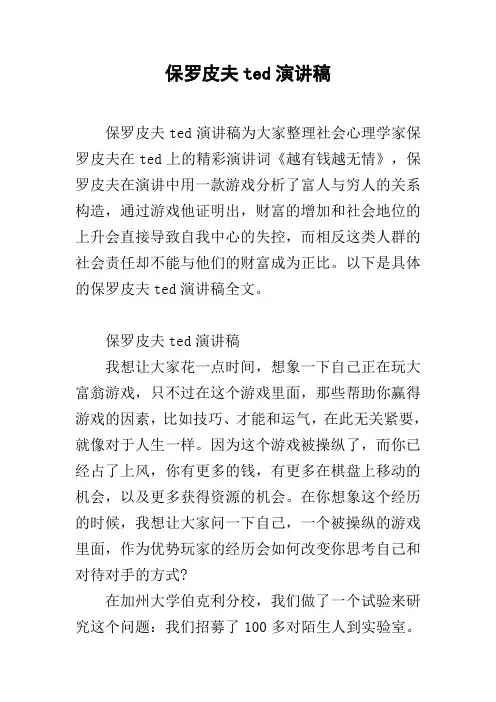
保罗皮夫ted演讲稿保罗皮夫ted演讲稿为大家整理社会心理学家保罗皮夫在ted上的精彩演讲词《越有钱越无情》,保罗皮夫在演讲中用一款游戏分析了富人与穷人的关系构造,通过游戏他证明出,财富的增加和社会地位的上升会直接导致自我中心的失控,而相反这类人群的社会责任却不能与他们的财富成为正比。
以下是具体的保罗皮夫ted演讲稿全文。
保罗皮夫ted演讲稿我想让大家花一点时间,想象一下自己正在玩大富翁游戏,只不过在这个游戏里面,那些帮助你赢得游戏的因素,比如技巧、才能和运气,在此无关紧要,就像对于人生一样。
因为这个游戏被操纵了,而你已经占了上风,你有更多的钱,有更多在棋盘上移动的机会,以及更多获得资源的机会。
在你想象这个经历的时候,我想让大家问一下自己,一个被操纵的游戏里面,作为优势玩家的经历会如何改变你思考自己和对待对手的方式?在加州大学伯克利分校,我们做了一个试验来研究这个问题:我们招募了100多对陌生人到实验室。
通过投掷硬币的方式,随机选定一对中的一个作为这个游戏中占上风的玩家。
他们拿到了两倍的钱,当他们途径起点的时候,他们拿到两倍的工资,而且他们可以同时掷两个骰子而不是一个,所以他们可以在棋盘上移动更多。
(笑声)在接下来的15分钟内,我们通过隐藏的摄像头观察了现场情况。
今天是第一次,我想和大家分享一下我们观察到的,有的时候音质可能不太好,还请大家原谅。
因为毕竟是用隐藏的摄像头,所以我们加上了字幕:富玩家:“你有多少张500块?”穷玩家:“就一张”。
富玩家:“真的吗?!”穷玩家:“是啊。
”富玩家:“我有三张。
(笑声)不知道为什么他们给了我那么多。
”所以玩家们很快就意识到,这个游戏明显有点奇怪一个玩家比另一个玩家,明显有更多的钱。
随着游戏慢慢展开,我们观察到两个玩家,开始有一些明显不同的表现。
富的玩家在棋盘上移动的声音更大,移动的时候几乎是在狠狠砸棋盘,我们看到了富玩家们更多的“霸主”信号、肢体动作、权力的显露以及互相庆祝。
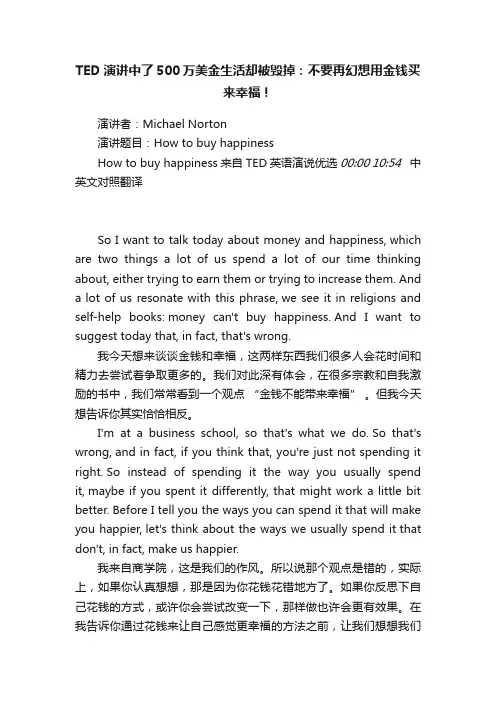
TED演讲中了500万美金生活却被毁掉:不要再幻想用金钱买来幸福!演讲者:Michael Norton演讲题目:How to buy happinessHow to buy happiness 来自TED英语演说优选00:0010:54中英文对照翻译So I want to talk today about money and happiness, which are two things a lot of us spend a lot of our time thinking about, either trying to earn them or trying to increase them. And a lot of us resonate with this phrase, we see it in religions and self-help books: money can't buy happiness. And I want to suggest today that, in fact, that's wrong.我今天想来谈谈金钱和幸福,这两样东西我们很多人会花时间和精力去尝试着争取更多的。
我们对此深有体会,在很多宗教和自我激励的书中,我们常常看到一个观点“金钱不能带来幸福”。
但我今天想告诉你其实恰恰相反。
I'm at a business school, so that's what we do. So that's wrong, and in fact, if you think that, you're just not spending it right. So instead of spending it the way you usually spend it, maybe if you spent it differently, that might work a little bit better. Before I tell you the ways you can spend it that will make you happier, let's think about the ways we usually spend it that don't, in fact, make us happier.我来自商学院,这是我们的作风。
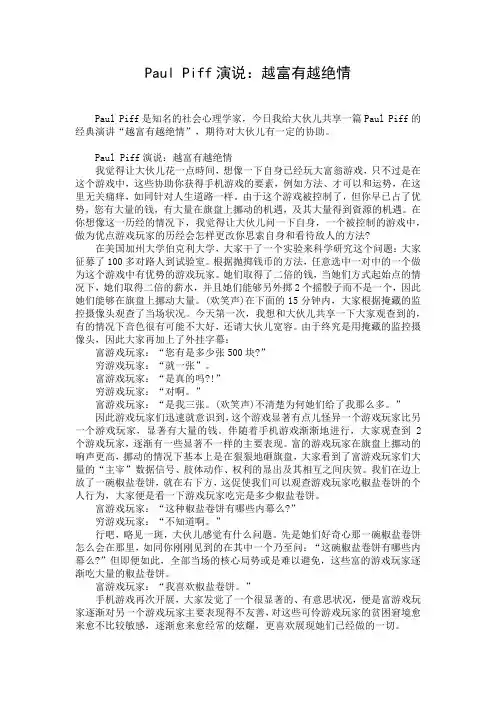
Paul Piff演说:越富有越绝情Paul Piff是知名的社会心理学家,今日我给大伙儿共享一篇Paul Piff的经典演讲“越富有越绝情”,期待对大伙儿有一定的协助。
Paul Piff演说:越富有越绝情我觉得让大伙儿花一点時间,想像一下自身已经玩大富翁游戏,只不过是在这个游戏中,这些协助你获得手机游戏的要素,例如方法、才可以和运势,在这里无关痛痒,如同针对人生道路一样。
由于这个游戏被控制了,但你早已占了优势,您有大量的钱,有大量在旗盘上挪动的机遇,及其大量得到資源的机遇。
在你想像这一历经的情况下,我觉得让大伙儿问一下自身,一个被控制的游戏中,做为优点游戏玩家的历经会怎样更改你思索自身和看待敌人的方法?在美国加州大学伯克利大学,大家干了一个实验来科学研究这个问题:大家征募了100多对路人到试验室。
根据抛掷钱币的方法,任意选中一对中的一个做为这个游戏中有优势的游戏玩家。
她们取得了二倍的钱,当她们方式起始点的情况下,她们取得二倍的薪水,并且她们能够另外掷2个摇骰子而不是一个,因此她们能够在旗盘上挪动大量。
(欢笑声)在下面的15分钟内,大家根据掩藏的监控摄像头观查了当场状况。
今天第一次,我想和大伙儿共享一下大家观查到的,有的情况下音色很有可能不大好,还请大伙儿宽容。
由于终究是用掩藏的监控摄像头,因此大家再加上了外挂字幕:富游戏玩家:“您有是多少张500块?”穷游戏玩家:“就一张”。
富游戏玩家:“是真的吗?!”穷游戏玩家:“对啊。
”富游戏玩家:“是我三张。
(欢笑声)不清楚为何她们给了我那么多。
”因此游戏玩家们迅速就意识到,这个游戏显著有点儿怪异一个游戏玩家比另一个游戏玩家,显著有大量的钱。
伴随着手机游戏渐渐地进行,大家观查到2个游戏玩家,逐渐有一些显著不一样的主要表现。
富的游戏玩家在旗盘上挪动的响声更高,挪动的情况下基本上是在狠狠地砸旗盘,大家看到了富游戏玩家们大量的“主宰”数据信号、肢体动作、权利的显出及其相互之间庆贺。
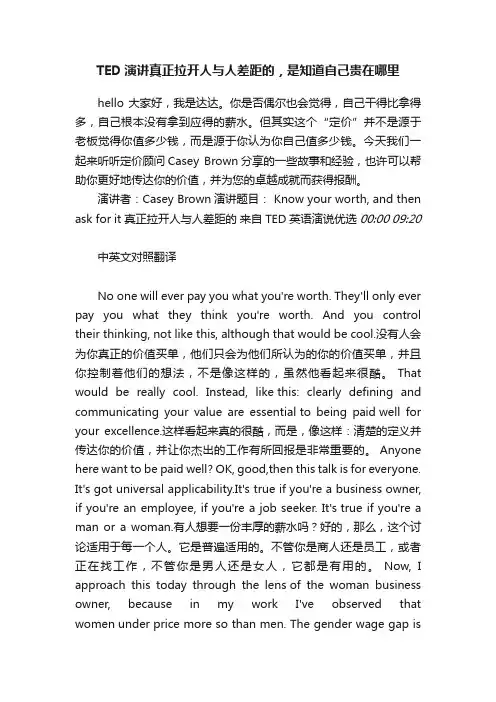
TED演讲真正拉开人与人差距的,是知道自己贵在哪里hello大家好,我是达达。
你是否偶尔也会觉得,自己干得比拿得多,自己根本没有拿到应得的薪水。
但其实这个“定价”并不是源于老板觉得你值多少钱,而是源于你认为你自己值多少钱。
今天我们一起来听听定价顾问Casey Brown分享的一些故事和经验,也许可以帮助你更好地传达你的价值,并为您的卓越成就而获得报酬。
演讲者:Casey Brown演讲题目: Know your worth, and then ask for it 真正拉开人与人差距的来自TED英语演说优选00:0009:20中英文对照翻译No one will ever pay you what you're worth. They'll only ever pay you what they think you're worth. And you control their thinking, not like this, although that would be cool.没有人会为你真正的价值买单,他们只会为他们所认为的你的价值买单,并且你控制着他们的想法,不是像这样的,虽然他看起来很酷。
That would be really cool. Instead, like this: clearly defining and communicating your value are essential to being paid well for your excellence.这样看起来真的很酷,而是,像这样:清楚的定义并传达你的价值,并让你杰出的工作有所回报是非常重要的。
Anyone here want to be paid well? OK, good,then this talk is for everyone. It's got universal applicability.It's true if you're a business owner, if you're an employee, if you're a job seeker. It's true if you're a man or a woman.有人想要一份丰厚的薪水吗?好的,那么,这个讨论适用于每一个人。
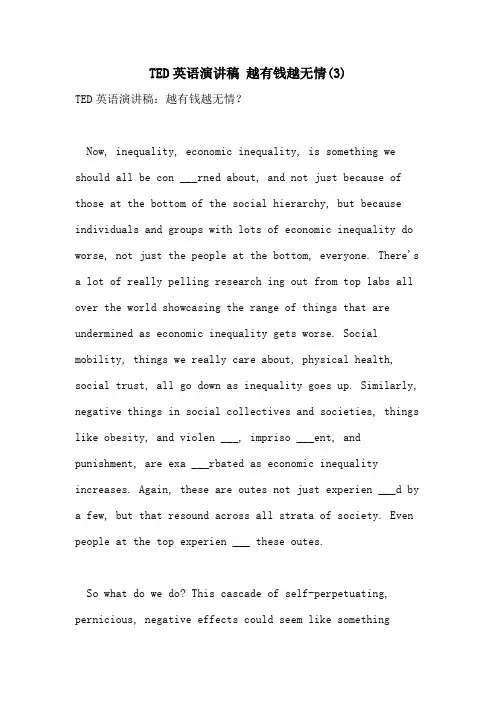
TED英语演讲稿越有钱越无情(3)TED英语演讲稿:越有钱越无情?Now, inequality, economic inequality, is something we should all be con ___rned about, and not just because of those at the bottom of the social hierarchy, but because individuals and groups with lots of economic inequality do worse, not just the people at the bottom, everyone. There's a lot of really pelling research ing out from top labs all over the world showcasing the range of things that are undermined as economic inequality gets worse. Social mobility, things we really care about, physical health, social trust, all go down as inequality goes up. Similarly, negative things in social collectives and societies, things like obesity, and violen ___, impriso ___ent, and punishment, are exa ___rbated as economic inequality increases. Again, these are outes not just experien ___d by a few, but that resound across all strata of society. Even people at the top experien ___ these outes.So what do we do? This cascade of self-perpetuating, pernicious, negative effects could seem like somethingthat's spun out of control, and there's nothing we can do about it, ___rtainly nothing we as individuals could do. But in fact, we've been finding in our own laboratory research that s ___ll psychological interventions, s ___ll changes to people's values, s ___ll nudges in ___rtain directions, can restore levels of egalitariani ___ and empathy. For instan ___, reminding people of the benefits of cooperation, or the advantages of munity, cause wealthier individuals to be just as egalitarian as poor people. In one study, we had people watch a brief video, just 46 seconds long, about childhood poverty that served as a reminder of the needs of others in the world around them, and after watching that, we looked at how willing people were to offer up their own time to a stranger presented to them in the lab who was in distress. After watching this video, an hour later, rich people became just as generous of their own time to help out this other person, a stranger, as someone who's poor, suggesting that these differen ___s are not innate or categorical, but are so ___lleable to slight changes in people's values, and little nudges of passion and bumps of empathy.And beyond the walls of our lab, we're even beginning to see signs of change in society. Bill Gates, one of our nation's wealthiest individuals, in his Harvard men ___ment speech, talked about the problem facing society of inequality as being the most daunting challenge, and talked about what must be done to bat it, saying, "Hu ___nity's greatest advan ___s are not in its discoveries, but in how those discoveries are applied to redu ___ inequity." And there's the Giving Pledge, in which more than 100 of our nation's wealthiest individuals are pledging half of their fortunes to charity. And there's the emergen ___ of dozens of grassroots movements, like We are the One Per ___nt, the Resour ___ Generation, or Wealth for Common Good, in which the most privileged members of the population, members of the one per ___nt and elsewhere, people who are wealthy, are using their own economic resour ___s, ___s and youth alike, that's what's most striking to me, leveraging their own privilege, their own economic resour ___s, to bat inequality by advocating for social policies, changes in social values, and changes in people's behavior, that work against their own economic interests but that ___y ulti___tely restore the American dream.Thank you.(Applause)模板,内容仅供参考。
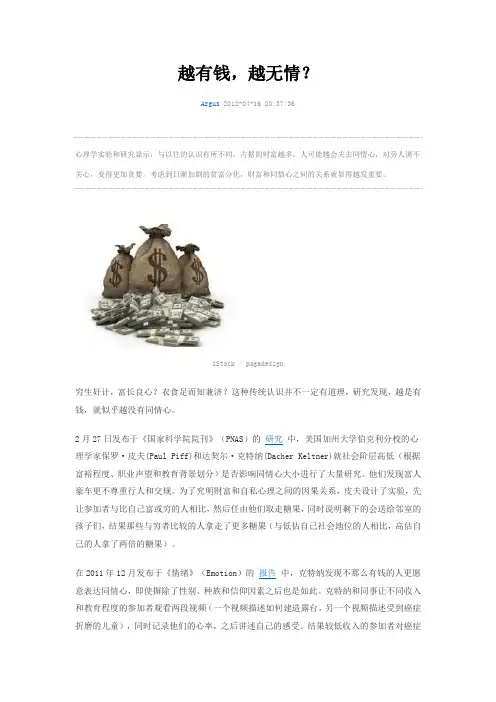
越有钱,越无情?Argus 2012-04-16 20:37:36心理学实验和研究显示,与以往的认识有所不同,占据的财富越多,人可能越会失去同情心,对旁人漠不 关心,变得更加贪婪。
考虑到日渐加剧的贫富分化,财富和同情心之间的关系就显得越发重要。
iStock / pagadesign穷生奸计,富长良心?衣食足而知兼济?这种传统认识并不一定有道理,研究发现,越是有 钱,就似乎越没有同情心。
2 月 27 日发布于《国家科学院院刊》(PNAS)的 研究 中,美国加州大学伯克利分校的心 理学家保罗·皮夫(Paul Piff)和达契尔·克特纳(Dacher Keltner)就社会阶层高低(根据 富裕程度、职业声望和教育背景划分)是否影响同情心大小进行了大量研究。
他们发现富人 豪车更不尊重行人和交规。
为了究明财富和自私心理之间的因果关系,皮夫设计了实验,先 让参加者与比自己富或穷的人相比, 然后任由他们取走糖果, 同时说明剩下的会送给邻室的 孩子们,结果那些与穷者比较的人拿走了更多糖果(与低估自己社会地位的人相比,高估自 己的人拿了两倍的糖果)。
在 2011 年 12 月发布于《情绪》(Emotion)的 报告 中,克特纳发现不那么有钱的人更愿 意表达同情心,即使摒除了性别、种族和信仰因素之后也是如此。
克特纳和同事让不同收入 和教育程度的参加者观看两段视频 (一个视频描述如何建造露台, 另一个视频描述受到癌症 折磨的儿童),同时记录他们的心率,之后讲述自己的感受。
结果较低收入的参加者对癌症儿童更加同情,而且变慢的心率也显示他们看视频时更加专心、更受感动。
这些研究表明富 人在体会他人感受和同情他人方面做得更差。
然而, 这是为什么?难道缺乏生活资源不会引 发自私心理吗? 皮夫猜测,经济处境越独立也越使人忽视旁人的感受,越以自我为中心,不关注他人(比如 和人交互时看手机,或者在纸上乱画)。
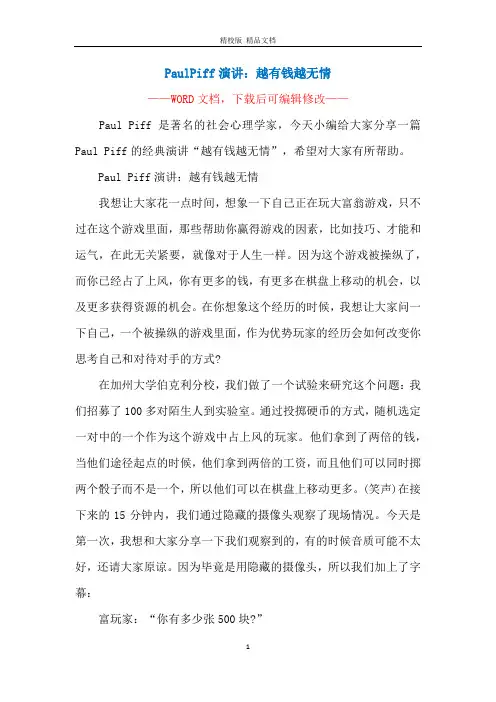
PaulPiff演讲:越有钱越无情——WORD文档,下载后可编辑修改——Paul Piff是著名的社会心理学家,今天小编给大家分享一篇Paul Piff的经典演讲“越有钱越无情”,希望对大家有所帮助。
Paul Piff演讲:越有钱越无情我想让大家花一点时间,想象一下自己正在玩大富翁游戏,只不过在这个游戏里面,那些帮助你赢得游戏的因素,比如技巧、才能和运气,在此无关紧要,就像对于人生一样。
因为这个游戏被操纵了,而你已经占了上风,你有更多的钱,有更多在棋盘上移动的机会,以及更多获得资源的机会。
在你想象这个经历的时候,我想让大家问一下自己,一个被操纵的游戏里面,作为优势玩家的经历会如何改变你思考自己和对待对手的方式?在加州大学伯克利分校,我们做了一个试验来研究这个问题:我们招募了100多对陌生人到实验室。
通过投掷硬币的方式,随机选定一对中的一个作为这个游戏中占上风的玩家。
他们拿到了两倍的钱,当他们途径起点的时候,他们拿到两倍的工资,而且他们可以同时掷两个骰子而不是一个,所以他们可以在棋盘上移动更多。
(笑声)在接下来的15分钟内,我们通过隐藏的摄像头观察了现场情况。
今天是第一次,我想和大家分享一下我们观察到的,有的时候音质可能不太好,还请大家原谅。
因为毕竟是用隐藏的摄像头,所以我们加上了字幕:富玩家:“你有多少张500块?”穷玩家:“就一张”。
富玩家:“真的吗?!”穷玩家:“是啊。
”富玩家:“我有三张。
(笑声)不知道为什么他们给了我那么多。
”所以玩家们很快就意识到,这个游戏明显有点奇怪一个玩家比另一个玩家,明显有更多的钱。
随着游戏慢慢展开,我们观察到两个玩家,开始有一些明显不同的表现。
富的玩家在棋盘上移动的声音更大,移动的时候几乎是在狠狠砸棋盘,我们看到了富玩家们更多的“霸主”信号、肢体动作、权力的显露以及互相庆祝。
我们在旁边放了一碗椒盐卷饼,就在右下角,这使得我们可以观察玩家吃椒盐卷饼的行为,我们就是看看玩家吃了多少椒盐卷饼。
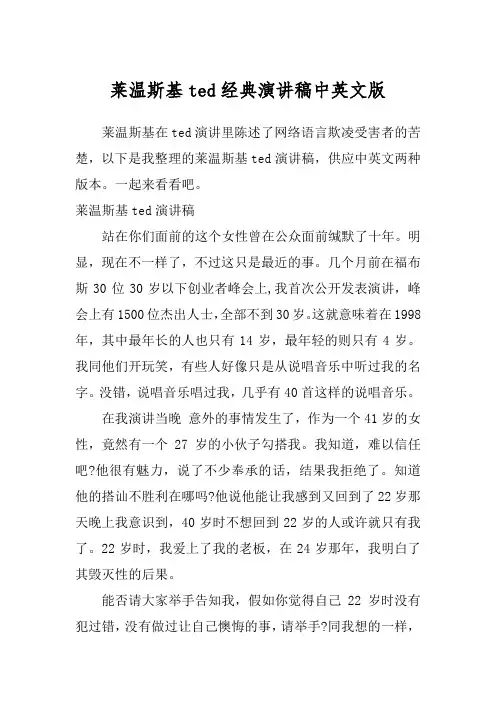
莱温斯基ted经典演讲稿中英文版莱温斯基在ted演讲里陈述了网络语言欺凌受害者的苦楚,以下是我整理的莱温斯基ted演讲稿,供应中英文两种版本。
一起来看看吧。
莱温斯基ted演讲稿站在你们面前的这个女性曾在公众面前缄默了十年。
明显,现在不一样了,不过这只是最近的事。
几个月前在福布斯30位30岁以下创业者峰会上,我首次公开发表演讲,峰会上有1500位杰出人士,全部不到30岁。
这就意味着在1998年,其中最年长的人也只有14岁,最年轻的则只有4岁。
我同他们开玩笑,有些人好像只是从说唱音乐中听过我的名字。
没错,说唱音乐唱过我,几乎有40首这样的说唱音乐。
在我演讲当晚意外的事情发生了,作为一个41岁的女性,竟然有一个27岁的小伙子勾搭我。
我知道,难以信任吧?他很有魅力,说了不少奉承的话,结果我拒绝了。
知道他的搭讪不胜利在哪吗?他说他能让我感到又回到了22岁那天晚上我意识到,40岁时不想回到22岁的人或许就只有我了。
22岁时,我爱上了我的老板,在24岁那年,我明白了其毁灭性的后果。
能否请大家举手告知我,假如你觉得自己22岁时没有犯过错,没有做过让自己懊悔的事,请举手?同我想的一样,和我一样,22岁那年,你们中的一些人也许也犯过错,爱上过错误的人,或许也正是你的老板。
不过和我不同,你的老板八成不是美国总统。
当然,生活充溢了意外。
每一天我都被提示这个错误,我每天都在深深懊悔。
1998年在卷入一段不行能的爱情之后,我被卷入政治、法律和媒体的漩涡中心,一场前所未见的漩涡。
记得吧,就在几年前,新闻只有三个来源:读报刊杂志、听收音机和看电视,就这些了。
但我的命并没这么好,这起丑闻通过数字革命被公之于众。
数字革命意味着我们能获得全部想要的信息,不管何时何地。
丑闻在1998年1月被首次揭露就是通过互联网。
这是传统媒体第一次在重大事务报道上被因特网抢先,一个点击的声音响彻了全世界。
对我个人而言,它让我一夜间从一个完完全全的无名人士变成一个被全世界公开羞辱的对象。
社会心理学家研究:人越有钱,越无情身为一个有钱人,钱会如何影响我们的行为?社会心理学家保罗?皮福(Paul Piff)以有力的例证,说明这样的情况-不太妙。
保罗?皮福合理化自己的行为Piff在TEDxMarin的演讲中表示:「一个人的财富水平上升后,会变得比较没有同情心,而且觉得他们应该得到更多,更重视自身利益。
」皮福和他的团队研究发现,有钱的人较容易把贪心和自私的行为合理化,不但减少对社会有利的行为,当他们觉得有需要时,还可能做出欺骗或触法的行为。
研究结果并非批判这些研究结果并不是要用来控诉有钱人。
皮福说:「我们生活中的每分每秒,都在为了某天能把私利置于他人利益之前而努力。
」他表示,这其实就是追求「美国梦」所造成的结果。
然而,美国现阶段严重的贫富差距令人忧心,富有会让私利的问题持续存在,贫富差距因此可能越来越大。
好消息是,要改变富有所造成的自私心态并不困难。
皮福表示:「只要有一点点指引,就可以修正有钱人的同理心。
」只要稍微提醒他们合作和群体关系的裨益,就可以改善这个问题。
除了视频外,我们也来看看皮福的其他研究发现吧!发现一:人占优势时,会说服自己这一切本来就是应得的。
研究过程:皮福在柏克莱大学的研究中,找来100对互不相识的人玩大富翁。
他们以掷铜板的方式,决定谁可以当比较有钱的玩家。
有钱的玩家一开始就有两倍的钱,走完一圈的薪水也是两倍;另外,他们一次可以掷两个骰子,所以走得比较快。
皮福透过摄像机观察这两个玩家进行游戏时的行为。
研究发现:有钱的玩家在移动棋子时比较大声,而且会摆出橄榄球员触地得分时的兴奋手势,他们甚至会吃更多身旁的脆饼,而且变得比较没礼貌。
此外,有钱的玩家对这种情况的理解会出现严重偏差,他们会高谈如何获胜,即使游戏的设计就是要让他们稳操胜券。
皮福说:「这个观察清楚地显示出他们如何合理化自己的优势。
」发现二:赚比较少钱的人比较慷慨。
(小规模的观察法)研究过程:皮福把富有跟贫穷的人请到他的实验室,给每个人十元美金,并告诉他们,他们可以自己保留这十元,也可以和陌生人分享一部份。
活在世上做好自己足矣"I used to think the worst thing in life was to end up all alone.“我曾经认为生活中最糟糕的事情就是孤独终老。
It's not.并不是。
The worst thing in life is to end up with people that make you feel all alone." --Robin Williams生活中最糟糕的事情就是和让你感到孤独的人在一起。
”——罗宾·威廉姆斯Codependency is a potentially destructive state to be in.相互依赖是一种潜在的破坏性状态。
At its core, it means that you cannot be alone.本质上,这意味着你无法独处。
And the consequence of this is an ongoing clinging to other people; no matter how bad they treat you. 这样做的结果就是你会持续地依附于他人,不管他们对你有多坏。
But it's an illusion to think that we need someone else to make us feel complete.但是认为我们需要别人来让我们感到完整是一种错觉。
We don't.我们不需要。
When we let our contentment depend on external things, we have given our power away.当我们让自己的满足依赖于外在的东⻄时,我们已经失去了自己的力量。
As humans, we aren't islands.作为人类,我们不是岛屿。
越有钱越无情的主题的TED英语演讲稿Ladies and gentlemen, welcome to this TED talk. Today, I want to talk about the theme of "the wealthier, the more ruthless."Money is a powerful tool that can bring people great joy and success, but it can also bring out the worst in people. The more money a person has, the more he or she tends to think that money can solve every problem. In fact, it can create more problems than it can resolve.When people become wealthy, they often develop a sense of entitlement. They believe that because they have worked hard and earned their money, they have the right to do whatever they want with it. This mentality leads to a lack of empathy for those who are less fortunate and a disregard for the consequences of their actions.With wealth comes power, and with power comes responsibility. Unfortunately, not everyone recognizes this responsibility. Many wealthy individuals are able to skate by without ever looking at the consequences of their actions, as they have the financial means to buy their way out of trouble. This is a dangerous game in which the wealthy become unaccountable for their choices and actions.The wealthier people are, the more they tend to see others as competitors or obstacles standing in their way. They become ruthless in their pursuit of success, often trampling on those who stand in their way. The wealthier they become, the more they view people as a means to an end, rather than as human beings with their own unique experiences and aspirations.In some cases, the wealthy become so entrenched in their own sense of superiority that they forget the importance of humility. They begin to see themselves as untouchable, above the law, and immune to criticism. This arrogance is a surefire way to alienate others and ultimately end in downfall.The wealthier a person becomes, the more they often become disconnected from society. They begin to live in their own world, enclosed in the comfort of their material possessions and money. In this world, they may lose sight of what is truly important, such as family, friends, community, and charity.To conclude, it is crucial that we recognize the dangers inherent in becoming too wealthy and blinded by our own success. It's essential that we use our wealth for good and not allow it to consume us. We need to be responsible, humble, and empathetic, and remember the importance of living life fully and not just existing in it. Thank you for listening to my TED talk.。
TED英语演讲稿TED英语演讲稿。
e ice cream.See, us kids are going to ansatically be happy and healthy.es doe from Dr. Roger e of those parents like mine counted it as one of the reasons they felt confident to pull their kids from traditional school to try something different. I realized Im part of this small, but groputer hacker, he hacked skiing. His creativity and inventions made skiing munity, and through a around the nation, and that sparked my love of e basic physics concepts like kiic energy through experimenting and making mistakes.So Im starting to think, I know what I might want to do when I grow up, but if you ask me what do I want to be when I grow up? Ill always know that I want to be happy. Thank you.f132.更多演讲稿延伸阅读杨澜TED英语演讲稿以下是演讲站为大家整理推荐的杨澜在TED大会上的一篇题为The generation thats remaking China(重塑中国的一代)的演讲稿中英原文。
莱温斯基ted演讲稿莱温斯基ted演讲稿陈述了网络语言欺凌受害者的苦楚,这里从莱温斯基22岁的时候担任白宫实习生开始,因为她爱上了她的老板,也就是克林顿总统,然之莱温斯基被贴上了丑恶的标签,这次站在TED演讲上表达了她的想法,以下是XX整理的莱温斯基ted演讲稿,提供中英文两种版本。
莱温斯基ted演讲稿站在你们面前的这个女性曾在公众面前沉默了十年。
显然,现在不一样了,不过这只是最近的事。
几个月前在福布斯”30位30岁以下创业者”峰会上,我首次公开发表演讲,峰会上有1500位杰出人士,全部不到30岁。
这就意味着在1998年,其中最年长的人也只有14岁,最年轻的则只有4岁。
我同他们开玩笑,有些人似乎只是从说唱音乐中听过我的名字。
没错,说唱音乐唱过我,几乎有40首这样的说唱音乐。
在我演讲当晚意外的事情发生了,作为一个41岁的女性,竟然有一个27岁的小伙子勾搭我。
我知道,难以相信吧?他很有魅力,说了不少奉承的话,结果我拒绝了。
知道他的搭讪不成功在哪吗?他说他能让我感到又回到了22岁……那天晚上我意识到,40岁时不想回到22岁的人或许就只有我了。
22岁时,我爱上了我的老板,在24岁那年,我明白了其毁灭性的后果。
能否请大家举手告诉我,如果你觉得自己22岁时没有犯过错,没有做过让自己后悔的事,请举手?同我想的一样,和我一样,22岁那年,你们中的一些人大概也犯过错,爱上过错误的人,或许也正是你的老板。
不过和我不同,你的老板八成不是美国总统。
当然,生活充满了意外。
每一天我都被提醒这个错误,我每天都在深深后悔。
1998年在卷入一段不可能的爱情之后,我被卷入政治、法律和媒体的漩涡中心,一场前所未见的漩涡。
记得吧,就在几年前,新闻只有三个来源:读报刊杂志、听收音机和看电视,就这些了。
但我的命并没这么好,这起丑闻通过数字革命被公之于众。
数字革命意味着我们能获取所有想要的信息,不管何时何地。
丑闻在1998年1月被首次揭露就是通过互联网。
ted演讲稿中英文对照TED演讲,越有钱越无情(中英对照版).(摄于TEDx加州马林县)PaulPiffstudieshowsocialhierarchy,inequalityandemotionshaperelationsb etweenindividualsandgroups.Whyyoushouldlisten:PaulPiffisanAssistantPr ofessorofPsychologyandSocialBehaviorattheUniversityofCalifornia,Irvin e.Inparticular,hestudieshowwealth(havingitornothavingit)canaffectinte rpersonalrelationships.Hissurprisingstudiesincluderunningriggedgameso fMonopoly,trackinghowthosewhodriveexpensivecarsbehaveversusthosedrivi nglessexpensivevehiclesandevendeterminingthatrichpeopleareliterallymo relikelytotakecandyfromchildrenthanthelesswell-off.Theresultsoftendon "tpaintaprettypictureaboutthemotivatingforcesofwealth.Hewrites,\Whato therssay:Whenwasthelasttime,asPiffputsit,thatyouprioritizedyourownint erestsabovetheinterestsofotherpeopleWasityesterday,whenyoubarkedatthe waitressfornotdeliveringyourcappuccinowithsufficientpromptnessPerhaps itwaslastweek,when,latetowork,youzoomedpastamomstrugglingwithastrolle ronthesubwaystairsandjustifiedyourheedlessnesswitharuthlessbutinargua blearithmetic:Today,the9a.m.meetinghasgottoefirst;thatlady’sstrollercan’tbemyproblem.Piffisoneofanewgenerationofscientists—psychologists,economists,marketingprofessors,andneurobiologists—whoareexploitingthismomentofunprecedentedineinequalitytoexplorebehavi orslikethose.—LisaMiller,NewYorkMagazine演讲稿正文Iwantyouto,foramoment,thinkaboutplayingagameofMonopoly,exceptinthisga me,thatbinationofskill,talentandluckthathelpea.只不过在这个游戏里面,那些帮助你赢的游戏的因素,比如技巧、才能和运气在此无关紧要,就像对于人生一样,因为这个游戏被操纵了,而你已经占了上风,你有更多的钱,有更多在棋盘上移动的机会以及更对获得资源的机会.在你想象这一经历的过程中,我想让大家问一下自己,一个被操纵的游戏里面作为优势玩家的经历会如何改变你思考自己和对待对手的方式?SoweranastudyontheU.C.Berkeleycampustolookatexactlythatquestion.Webro ughtinmorethan100pairsofstrangersintothelab,andwiththeflipofacoinrand omlyassignedoneofthetwotobearichplayerinariggedgame.Theygottwotimesas muchmoney.WhentheypassedGo,theycollectedtwicethesalary,andtheygottoro llbothdiceinsteadofone,sotheygottomovearoundtheboardalotmore.(Laughte r)Andoverthecourseof15minutes,wewatchedthroughhiddencameraswhathappen ed.AndwhatIwanttodotoday,forthefirsttime,isshowyoualittlebitofwhatwes aw.You'regoingtohavetopardonthesoundquality,insomecases,becauseagain, thesewerehiddencameras.Sowe'veprovidedsubtitles.在加州大学伯克利分校,我们做了一个试验来研究这个问题.我们招募了100多对陌生人到实验室,通过投掷硬币的方式随机选中一对中的一个作为这个游戏中占上风的玩家.他们拿到了两倍的钱.当他们途径起点的时候,他们拿到两倍的工资,而且他们可以同时掷两个骰子而不是一个,所以他们可以在棋盘上移动更多.在接下来的15分钟内,我们通过隐藏的摄像头观察了现场情况.今天是第一次我想和大家分享一下我们观察到的,有的时候音质可能不太好,还请大家原谅,因为毕竟是用隐藏的摄像头,所以我们加上了字幕.RichPlayer:Howmany500sdidyouhave富玩家:你有多少张500块?PoorPlayer:Justone.穷玩家:就一张.RichPlayer:Areyouserious.富玩家:真的吗?PoorPlayer:Yeah.穷玩家:是的.RichPlayer:Ihavethree.(Laughs)Idon'tknowwhytheygavemesomuch.富玩家:我有三张.(笑声)不知道为什么他们给了我这么多.PaulPiff:Okay,soitwasquicklyapparenttoplayersthatsomethingwasup.On epersonclearlyhasalotmoremoneythantheotherperson,andyet,asthegameunfo lded,wesawverynotabledifferencesanddramaticdifferencesbegintoemergebe tweenthetwoplayers.Therichplayerstartedtomovearoundtheboardlouder,lit erallysmackingtheboardwiththeirpieceashewentaround.Weweremorelikelyto seesignsofdominanceandnonverbalsigns,displaysofpowerandcelebrationamongtherichplayers.保罗.皮夫:所以,玩家们很快就意识到这个游戏明显有点奇怪.一个玩家比另一个玩家明显有更多的钱.随着游戏慢慢展开,我们观察到两个玩家开始有一些明显不同的表现.富的玩家明显在棋盘上移动的声音更大,移动的时候几乎是在狠狠砸棋盘.我们看到富玩家们霸主信号、肢体动作,权力的显示以及相互庆祝.Wehadabowlofpretzelspositionedofftotheside.It'sonthebottomrightcorner there.Thatallowedustowatchparticipants'consummatorybehavior.Sowe'reju sttrackinghowmanypretzelsparticipantseat.我们在旁边放了一碗椒盐卷饼,就在右下角,这使得我们可以观察玩家吃椒盐卷饼的行为.我们就是看看玩家吃了多少椒盐卷饼.RichPlayer:Arethosepretzelsatrick富玩家:这些椒盐卷饼有什么猫腻吗?PoorPlayer:Idon'tknow.穷玩家:不知道啊.Okay,sonosurprises,peopleareontous.Theywonderwhatthatbowlofpretzel sisdoingthereinthefirstplace.Oneevenasks,likeyoujustsaw,isthatbowlofp retzelsthereasatrickAndyet,despitethat,thepowerofthesituationseemstoi nevitablydominate,andthoserichplayersstarttoeatmorepretzels.。
越有钱越无情It's amazing what a rigged game of Monopoly can reveal. In this entertaining but sobering talk, social psychologist Paul Piff shares his research into how people behave when they feel wealthy. (Hint: badly.) But while the problem of inequality is a complex and daunting challenge, there's good news too. (Filmed at TEDx Marin.) 一个被操纵的大富翁游戏能告诉我们的东西竟然有那么多!在这个有趣且发人深省的演讲中,社会心理学家保罗-皮夫分享了他对于“人感到富有时如何表现”的研究结果(暗示:很坏)。
在面对异常复杂、异常严峻的不平等问题的同时,我们也听到了好的消息。
(摄于TEDx加州马林县)Paul Piff studies how social hierarchy, inequality and emotion shape relations between individuals and groups.Why you should listen:Paul Piff is an Assistant Professor of Psychology and Social Behavior at the University of California, Irvine. In particular, he studies how wealth (having it or not having it) can affect interpersonal relationships.His surprising studies include running rigged games of Monopoly, tracking how those who drive expensive cars behave versus those driving less expensive vehicles and even determining that rich people are literally more likely to take candy from children than the less well-off. The results often don't paint a pretty picture about the motivating forces of wealth. He writes, "specifically, I have been finding that increased wealth and status in society lead to increased self-focus and, in turn, decreased compassion, altruism, and ethical behavior."What others say:“When was the last time, as Piff puts it, that you prioritized your own interests above the interests of other people? Was it yesterday, when you barked at the waitress for not delivering your cappuccino with sufficient promptness? Perhaps it was last week, when, late towork, you zoomed past a mom struggling with a stroller on the subway stairs and justified your heedlessness with a ruthless but inarguable arithmetic: Today, the 9 a.m. meeting has got to come first; that lady’s stroller can’t be my problem. Piff is one of a new generation of scientists—psychologists, economists, marketing professors, and neurobiologists—who are exploiting this moment of unprecedented income inequality to explore behaviors like those. ” —Lisa Miller, New York Magazine演讲稿正文I want you to, for a moment, think about playing a game of Monopoly, except in this game, that combination of skill, talent and luck that help earn you success in games, as in life, has been rendered irrelevant, because this game's been rigged, and you've got the upper hand. You've got more money, more opportunities to move around the board, and more access to resources. And as you think about that experience, I want you to ask yourself, how might that experience of being a privileged player in a rigged game change the way that you think about yourself and regard that other player?我想让大家花一点时间,想想一下自己正在玩大富翁游戏。
只不过在这个游戏里面,那些帮助你赢的游戏的因素,比如技巧、才能和运气在此无关紧要,就像对于人生一样,因为这个游戏被操纵了,而你已经占了上风,你有更多的钱,有更多在棋盘上移动的机会以及更对获得资源的机会。
在你想象这一经历的过程中,我想让大家问一下自己,一个被操纵的游戏里面作为优势玩家的经历会如何改变你思考自己和对待对手的方式?So we ran a study on the U.C. Berkeley campus to look at exactly that question. We brought in more than 100 pairs of strangers into the lab, and with the flip of a coin randomly assigned one of the two to be a rich player in a rigged game. They got two times as much money. When they passed Go, they collected twice the salary, and they got to roll both dice instead of one, so they got to move around the board a lot more. (Laughter) And over the course of 15 minutes, we watched through hidden cameras what happened. And what I want to do today, for the first time, is show you a little bitof what we saw. You're going to have to pardon the sound quality, in some cases, because again, these were hidden cameras. So we've provided subtitles.在加州大学伯克利分校,我们做了一个试验来研究这个问题。
我们招募了100多对陌生人到实验室,通过投掷硬币的方式随机选中一对中的一个作为这个游戏中占上风的玩家。
他们拿到了两倍的钱。
当他们途径起点的时候,他们拿到两倍的工资,而且他们可以同时掷两个骰子而不是一个,所以他们可以在棋盘上移动更多。
在接下来的15分钟内,我们通过隐藏的摄像头观察了现场情况。
今天是第一次我想和大家分享一下我们观察到的,有的时候音质可能不太好,还请大家原谅,因为毕竟是用隐藏的摄像头,所以我们加上了字幕。
Rich Player: How many 500s did you have?富玩家:你有多少张500块?Poor Player: Just one.穷玩家:就一张。
Rich Player: Are you serious.富玩家:真的吗?Poor Player: Yeah.穷玩家:是的。
Rich Player: I have three. (Laughs) I don't know why they gave me so much.富玩家:我有三张。
(笑声)不知道为什么他们给了我这么多。
Paul Piff: Okay, so it was quickly apparent to players that something was up. One person clearly has a lot more money than the other person, and yet, as the game unfolded, we saw very notable differences and dramatic differences begin to emerge between thetwo players. The rich player started to move around the board louder, literally smacking the board with their piece as he went around. We were more likely to see signs of dominance and nonverbal signs, displays of power and celebration among the rich players.保罗.皮夫:所以,玩家们很快就意识到这个游戏明显有点奇怪。